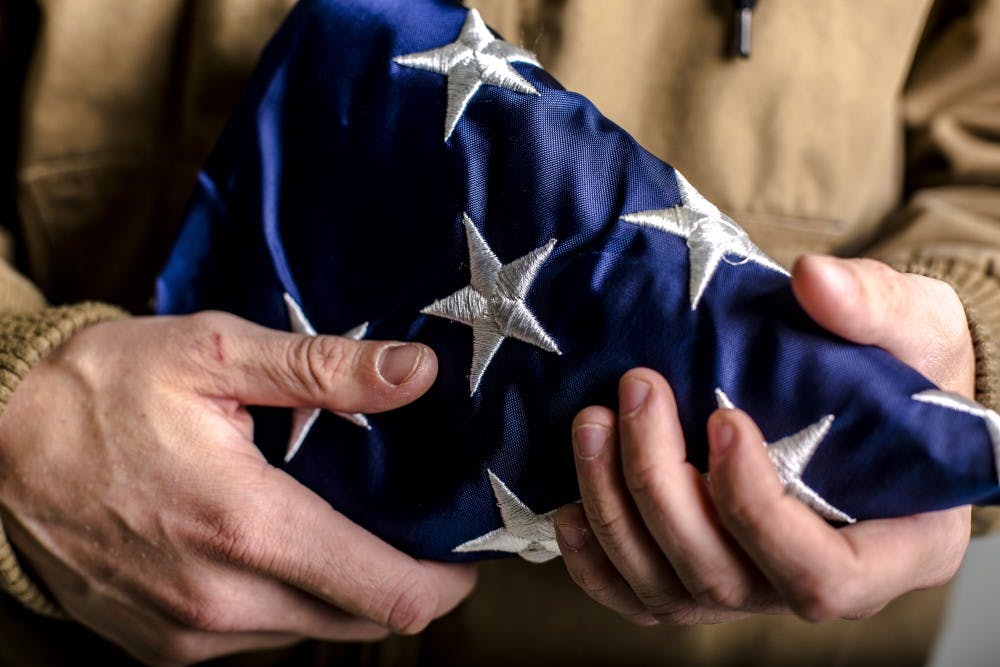Student veterans reflect on military experiences, adjusting to student life
After Larry Ashley graduated from Central Michigan University in 1969, his life took an unexpected turn — he was drafted to serve in the Vietnam War.
The experience had a lifelong impact on Ashley, who obtained an undergraduate degree in political science but has dedicated his life to working with people in trauma, now specializing in combat trauma.
After coming back from the war, Ashley, who now teaches classes at CMU, decided to return to CMU to obtain a master’s degree in health education. Because the war was unpopular, Ashley felt soldiers were looked down upon on campus and almost treated as enemies.
Though the challenges veterans face today might be different from what he experienced, he said fitting in on campus can still be a struggle for student veterans who have experienced situations that many people can't relate to.
“Coming back from a combat experience, it’s hard to adjust to the classrooms because you’re still on edge a lot,” Ashley said. “It’s very hard to come back from a life-threatening situation and just sit down in a classroom for an hour or two or three. If you’ve ever seen somebody die or kiss death, you’re different. You have to learn to put that in perspective and have support available to you.”
He thinks it’s important for veterans to have a mentor and support system, which he did not have when he returned.
About 60 student veterans currently attend CMU, said Duane Kleinhardt, director of the Veterans’ Resource Center.
The main focus of the Veterans’ Resource Center, Kleinhardt said, is to help military-affiliated students use their education benefits most effectively. The office also aims to help students feel comfortable on campus, creating a family-like atmosphere for student veterans who are used to the family feel of the military.
“They spend four years working with the same people, eating, sleeping, working, going into combat with the same people and they become very close,” Kleinhardt said. “They get out of active duty and come to a university and many of them don’t know anyone.”
Kleinhardt said it’s important to remember that the veteran population is as diverse as the U.S. population, and every veteran has had a different experience.
Graduate student Nicholas Eckhart joined the Army in 2003 because he thought he should serve his country after the Sept. 11 terrorist attacks.
When he left in 2009, he didn’t have a lot of direction because his identity was “in a freeze” while serving. The period after his military service was the most challenging part of the experience because he had to quickly figure out who he was and what he wanted to do.
When faced with this challenge, Eckhart relied on “trial and error,” obtaining various degrees and teaching in Ecuador for a year. Now, he plans on pursuing a doctorate degree in communication after completing the Master of Public Health program at CMU.
Another challenge he has faced is the stigma associated with serving in the military.
He once went to a job interview and was shocked when the interviewer asked him if he was going to come back and shoot the place up. He thinks the biggest misconception people have about those who have served in the military is that they are violent.
“You look at movies and you always see people that have violent outbursts or lashing out and stuff like that and that’s probably part of the cycle that people go through, but that’s not people,” Eckhart said. “Everybody has those moments but when you see it consistently portrayed in a certain type of people then everybody kind of has that feeling towards them and treats them that way.”
Central Michigan Life sat down with student veterans and talked to them about dealing with stereotypes and transitioning from being in the military to attending CMU.
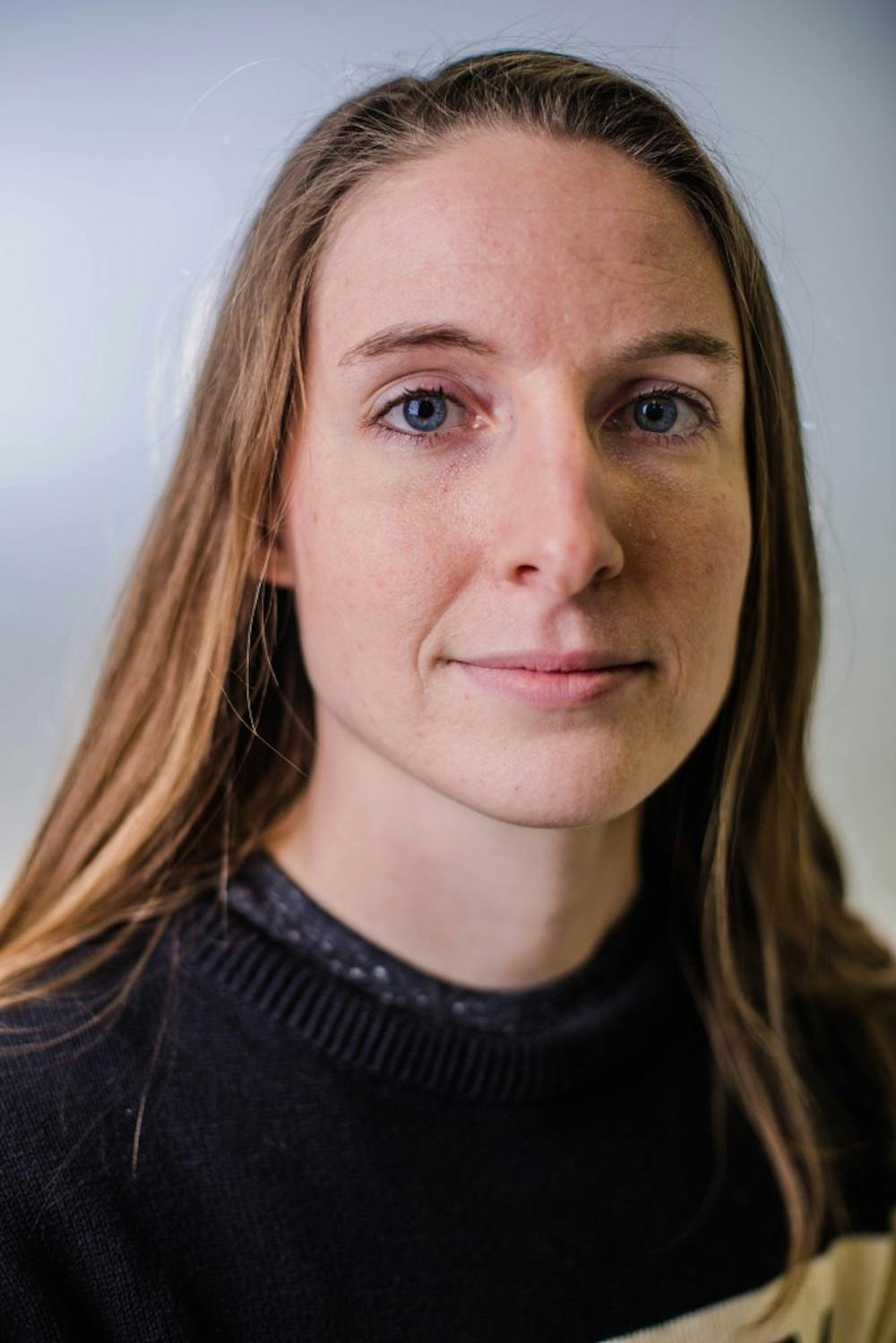
Grand Ledge senior Elli Cline, who served in the U.S. Army, poses on Nov. 10 in the Wightman Hall studio.
Elli Cline
Grand Ledge senior
Biology major
Army, 2010-13
The first thing Elli Cline felt when she came to campus was isolation. Unlike the structured military environment where she had a designated place, she had to find her place on campus. She felt like a "disgruntled, old 22-year-old" during her first year — but overcame those feelings by getting involved on campus.
She thinks people on campus should be aware of student veterans' leadership abilities.
Cline: "The first thing (awareness) does is not really for the public’s benefit — it helps the veterans because I know from personal experience that the hardest thing about being a veteran is owning that veteran part of your identity. As much as a lot of us try to ignore it at first, try to assimilate and be normal, that almost creates a fractured inner self. Having the public recognize that veterans are out there makes them more willing to own that part of their identity then they become more comfortable with themselves as a person. That’s really important because veterans are huge benefits to society. They are the ideal leaders that CMU is always saying ‘we want to make better leaders.’ Well, these are leaders that already have experience and right now you’re adding the education to it. Helping them in any way we can starting with giving them that visibility is really important."

Sterling Heights junior Cody Drouin poses on Nov. 10 in the Wightman Hall studio.
Cody Drouin
Sterling Heights senior
Exercise science major
Army, 2010-15 (active duty), 2015-17 (reserves)
The biggest challenge Cody Drouin faced when coming to CMU was thinking he didn't need any help. He had a few good professors who showed him what he needed to do and helped him be a better student, he said. In the military, Drouin learned the importance of patience and understanding. He had to interact with people during their worst moments, he said, and learn how to control his emotions.
Drouin: "Experiencing a different culture like in the Middle East (was valuable). I feel like there’s a lot of negative views about the Middle East and just interacting with the citizens over there really makes you take a step back and realize that they’re people too, they just live a different life. I was glad I got to experience that and just realize how lucky we have it here.
There is so much diversity in the military. It really teaches you to not care about a person’s skin color or where they’re from. They teach you to judge a person on their actions or their words, not on something as stupid as race or anything like that. It opened my eyes to see that not everyone is able to have these opportunities in life, like some people come from a really bad background, really abusive or troublesome homes, and to still be able to work with them on a common goal really builds a bond that’s unbreakable."
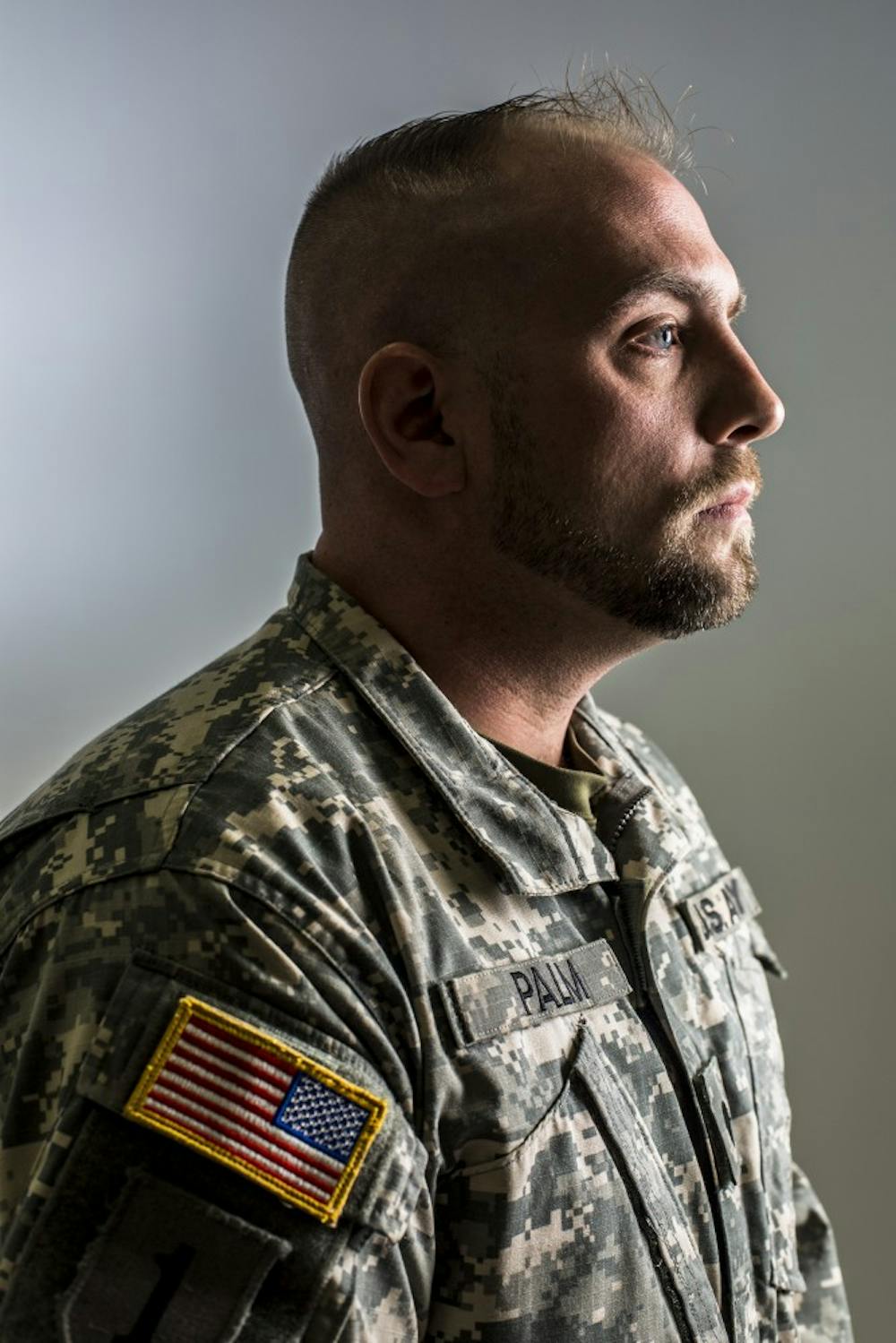
Port Huron senior DJ Palm poses on Nov. 10 in the Wightman Hall studio.
DJ Palm
Port Huron senior
Broadcast and Cinematic Arts major
Army, 2004-08
Port Huron senior DJ Palm's proudest moment was when he came home for two weeks and was reminded of all the people he had back home who loved him. Support from his family is also what helped him when he left the military.
Palm: "There’s probably about 40 of us at Thanksgiving every year and these are people that, we all call up each other and say happy birthday when birthdays are coming and to be away from that, yes, it does suck but in the back of your mind, you just have to have faith in God or whatever you believe in to know that you’re going to make it back alive to see them again one day. I don’t think I would be here, at CMU, doing what I need to do and advancing in my life, had it not been for the support system of my family when I got out because they were basically the legs that I was standing on. I don’t know where I would’ve started, I don’t know how I would’ve even began to climb out of the hole but I know I’m very lucky and very thankful for where I’m at because I have a great family support system."
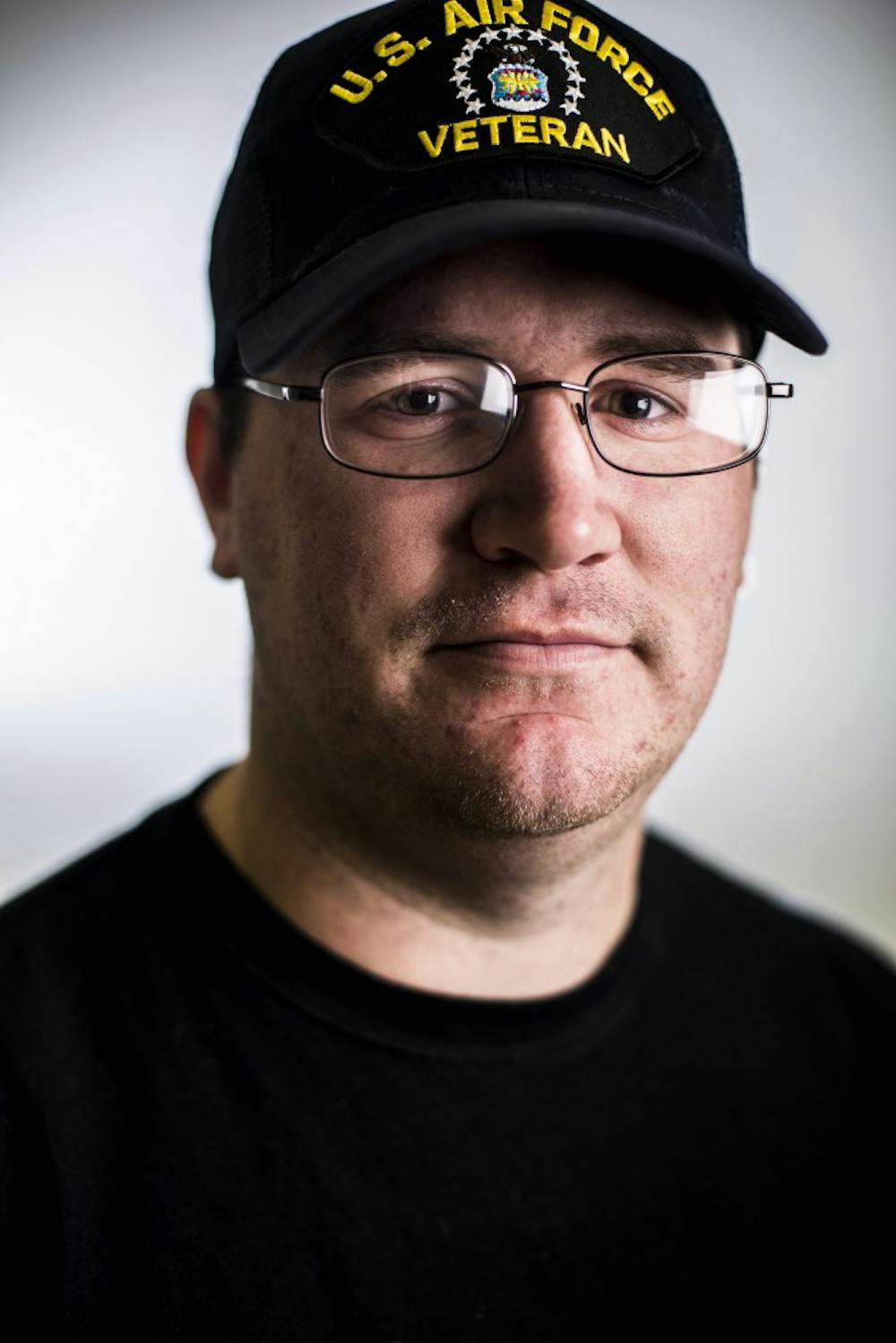
Royal Oak senior Grant Kelly, who served in the U.S. Air Force, poses on Nov. 10 in the Wightman Hall studio.
Grant Kelly
Royal Oak senior
Sport management major
Air Force, 2011-14
Grant Kelly is happy to have ever been part of the Air Force and said there's never enough he can give back. When he graduated from high school, he wasn't ready to go to college and didn't plan on going. It was difficult to get him to go to class in high school, he said, but now he likes being at CMU and hopes to go to law school. He doesn't think serving in the military is for everyone, but thinks everyone should learn more about it, whether it's through firsthand experience or stories.
He’s proud to have performed military funerals and said it’s difficult to have a straight face and convey no emotion when presenting the flag to someone who has lost a loved one. The first time he had to do it, he had to present the flag to a child who lost his grandpa and had tears running down his face.
Kelly: "War sucks. No one likes war. It honestly is a last resort for a lot of things. Just remembering veterans and all the things they’ve sacrificed (is important). Yeah, they’re normal people but they’ve also been through things you could never imagine. It’s incredible the things people will go through for their country and for the people they love. Half the country hates the other half but no one hates the military and that’s because without the military, you wouldn’t have the freedom to hate the other half."

Swartz Creek freshman JD Hopton, who served in the U.S. Army, poses on Nov. 10 in the Wightman Hall studio.
JD Hopton
Swartz Creek freshman
Athletic training major
Army, 2013-17
For JD Hopton, joining the military when he was 17 years old was a big culture shock. The military helped him discipline himself to set goals and achieve them. Hopton said he probably wouldn't be doing as well as he is right now without his military background. To him, one of the most difficult things about adjusting to campus life is making his own decisions and not following a set structure. He also faces additional struggles because he's been out of school for a while. While traditional freshmen are still familiar with how to structure an essay, he said, he hadn't written an essay for school in four years.
Hopton: "The (stereotype) I hate is 'people that go into the military, they’re just not smart enough for college.' I don’t like that one because I’m here, I’m doing it, side by side. And people believe that if you’re in the military, you’re just going to be picking up rifles and going to war against the enemy. Yes, there are people that do that but the majority of people are running support of the military. You’re still putting on the uniform but you’re doing the jobs that the infantry still need in order to get their job done."
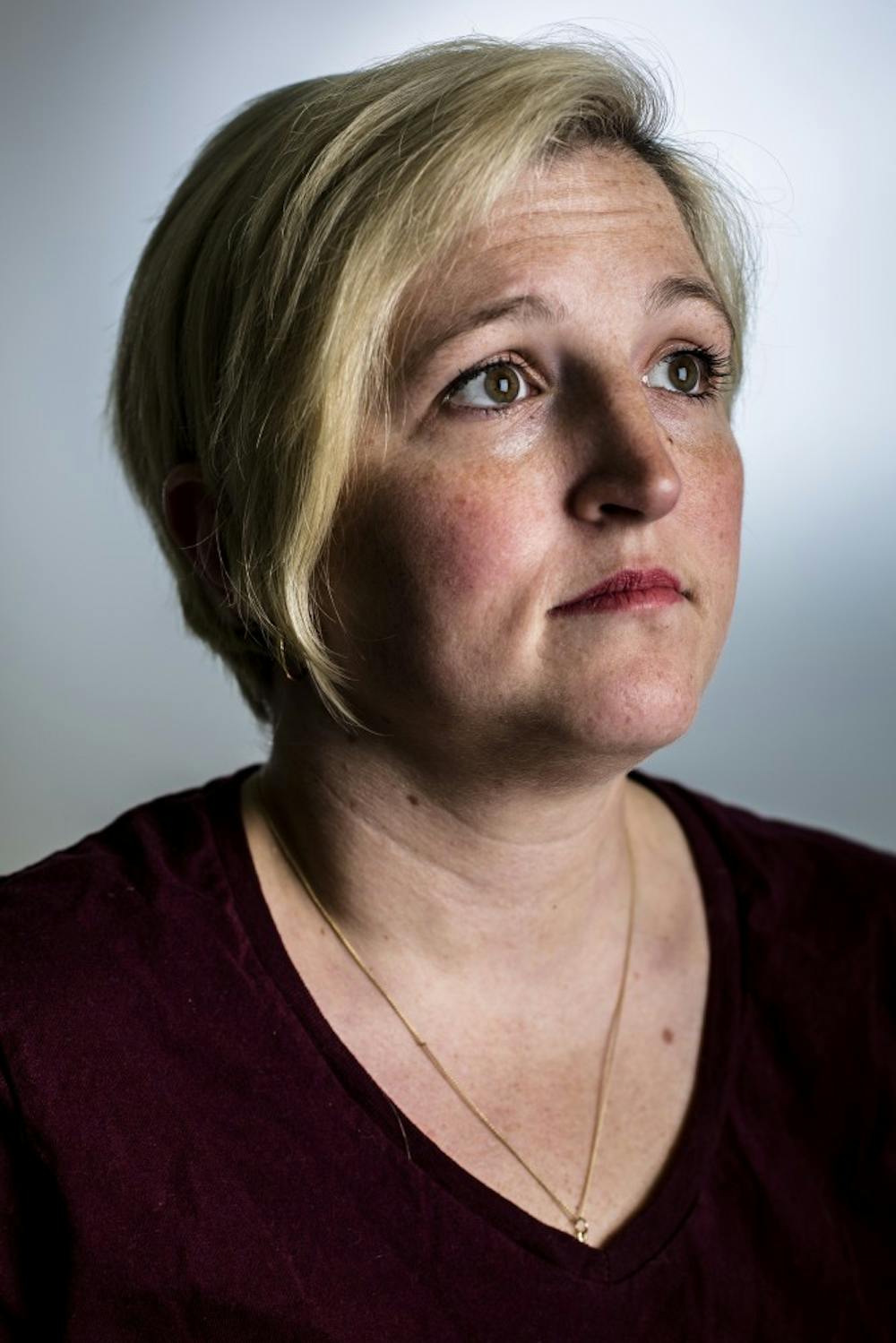
Mount Pleasant graduate student Colleen Schoenfeld, who served in the U.S. army, poses on Nov. 10 in the Wightman Hall studio.
Colleen Schoenfeld
Mount Pleasant graduate student
2003-06 (reserves), 2006-15 (active duty)
Colleen Schoenfeld said it takes time to adjust to how laidback people are and how they're not as straightforward as in the military. Her husband is also a veteran but if people see them wearing something military-related, they'll assume her husband was in the military, not her — she thinks the perception is that the military is mostly men, even though many women serve in the military too.
She thinks some people also have the misconception that all veterans are broken because of how they’re portrayed in the media. To address misconceptions, people could talk to veterans or service members and realize they’re all different kinds of people, she said.
Despite some misconceptions, most people are supportive and will say "thank you," she said.
Schoenfeld: "(The biggest thing I learned from serving is) it's not about you. I’d say it’s about taking care of people and making sure that the whole group, whole organization, is doing well, not just the individual person, whether it’s your country or it’s your family or it’s your unit, whatever it is, it’s about making the whole thing function as a unit instead of worrying just about me."
